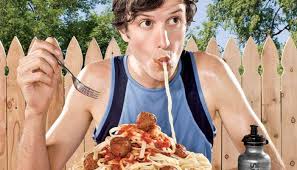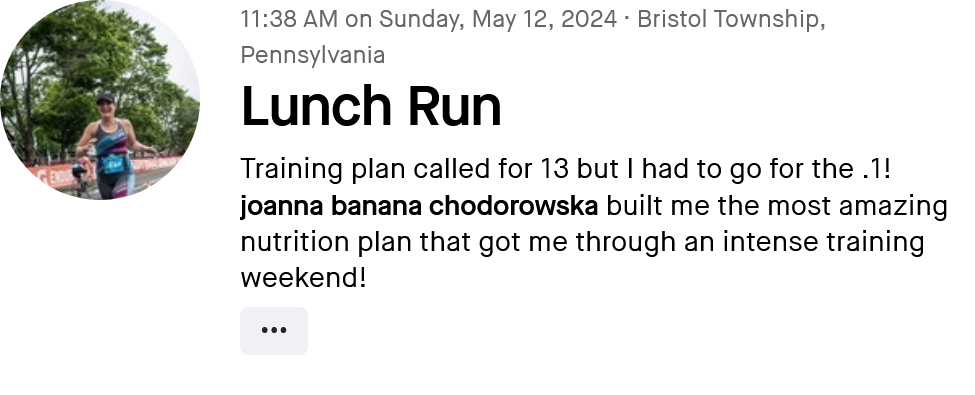In my experience as both an athlete and a coach, most triathletes follow the advice to eat as much as they can on the bike…but what I now suggest is to find out how LITTLE do you need?
Over the years, much has been written about pro-triathletes who can consume up to 500 calories per hour during training and racing. Some will suggest you need to ‘train your body’ to take in that higher amount of calories. Yet, countless athletes I have worked with who try this, just end up with GI issues which means they can no longer train or race as intended. Once you take in too many calories, your stomach shuts down and walking is the only solution, or stopping for that day. And this is a horrible option when in the middle of a triathlon run!
When I work with clients, part of the program involves balancing the blood sugar with balanced meals. Why? By balancing the meals, and balancing the timing of meals, you can help increase your metabolic efficiency. What that means is that you can train your body to burn more fat rather than burn sugar.
When your body is burning fat, it also accessed fat stores rather than just carbohydrate stores without having to be in that ‘fat burning’ zone. This means you won’t need to eat as many calories per hour as you would eating a standard athlete diet which is carbohydrate heavy. I know for me, that meant I was able to drop my caloric consumption from 300 calories per hour, to about 150 calories per hour on the bike, and even less on the run which is where too many calories is what causes digestive issues!
Did you know you have 80,000 calories worth of fat stores? But only 4,000 of carbohydrate stores. So wouldn’t you want to burn fat stores for fuel?
When you eat a standard athlete diet, it is a carb heavy diet. This means you need to keep adding more carbs even while training and racing to keep your energy levels up. Mainly because carbs spike and drop the blood sugar. The carbs are quickly utilized and you then have to keep adding calories just to keep going.

It can be lots of pasta, bread, bagels, energy bars and potatoes. This carb heavy diet can promote weight gain and also the need to take in more calories from sugars and carbs while you are exercising. The carb heavy diet forces blood sugar swings, too which make you more hungry more often, you crave more carbs and sometimes you just feel fat or you just cannot get lean or lose the extra weight. It is this imbalanced blood sugar management that makes the body sugar dependent rather than fat stores dependent.
When you learn how to balance the blood sugar, your body starts to use more of the fat stores for energy and so you don’t need as many calories per hour just to keep your energy up. This is often called metabolic efficiency, which I was certified as a Metabolic Specialist by eNRG Performance Institute. It’s not that hard once you know how to do it. It is actually quite easy when you work with someone like me who is an athlete and focuses on adjusting your nutrition so you include more real food, balance your blood sugar and manage your hydration so you perform at your best.
The clients I have worked with this year, one has lost 18 pounds without dieting and has realized the ‘Power of Nutrition’ where every week she would text me how great her training sessions were, and how when she got off a hilly bike ride, even a 100-miler, her legs felt fresh! She completed her Ironman and her legs felt fresh when she got to the marathon! Who has that? Those who balance their blood sugar and take in less calories than they did if they were eating a carb heavy nutrition plan!

If you want to perform better at your endurance event including Ironman or ultra running events, the key is to change your overall nutrition so you are balancing the blood sugar. Then you test it in training to see how little it is you need. You can always add a gel, a half a bar, some dates or whatever food you want if you need it. But as soon as you eat too much, bam, the stomach shuts down and you are walking, which means your race is no longer a race, but a walk trying not to feel so terrible.
But in order to take in less on both the bike and run, focus first on your overall nutrition. Then practice in training with the mindset of trying to see how little it is you need to take in for an Ironman. It may be half of what you have done in the past.